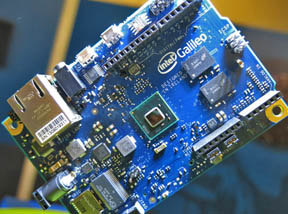There are a lot of MCU development kits available. Amazingly, Avnet has 21,600 development kits on their web site and Digikey 6,073 evaluation and demonstration boards and kits. Mouser has their large number of development boards divided up into 55 separate areas and offers 17,800 Engineering Tools.

Lots and lots to choose from in this area. I'll have a look at three interesting ones from Intel and ARM/Keil. Intel has two nice little boards.
Intel Galileo is Arduino functional
Galileo is a microcontroller board based on the new Intel Quark SoC X1000 low-power application processor, a 400-MHz 32-bit Pentium-class chip. It's the first board with an Intel-architecture Arduino board. The card is hardware and software pin-compatible with Arduino shields designed for the Uno R3. All pins are in the same locations as on the Arduino Uno R3.
The Galileo board supports I/O at either 3.3 or 5 V and is software compatible with the Arduino Software Development Environment. The Galileo board also has several PC industry-standard I/O ports — a full sized mini-PCI Express slot, a 10/100 Ethernet port, a Micro-SD slot, an RS-232 serial port, USB 2.0, and an 8-Mbyte NOR flash come standard on the board. The board is 10 cm long and 7 cm wide with some connectors extending beyond this outline. It takes around 2 W, and you can buy it for only $67.

The Intel Galileo
Tiny processor card
Another development board form Intel is the Edison, a tiny, ultra-power-efficient platform the size of an SD card. The possibilities for this card are endless for entrepreneurs and inventors of all kinds.
The Edison board, like the Galileo, uses a low-power 400-MHz Intel Quark processor — this one with two cores, Wi-Fi, and Bluetooth. Intel says the combination of small size, power, and connectivity make the Edison board a game changer, lowering the barriers to entry for thousands of visionaries. There's very little information available on this diminutive card at this point. People are guessing it will cost ~$10 and it will be available in “the middle of 2014 — or so said Intel CEO Brian Krzanich during his keynote at CES.

The Intel Edison development board
ARM Cortex-M Prototyping System
ARM has announced the new Cortex-M Prototyping System as part of its Versatile family of products. This development board comes with fixed encrypted images of the Cortex-M series of processors (M0, M0+, M1, M3, M4). It has an application note for the Cortex-M0 design start in an example subsystem which is user modifiable. The system is fully supported in the ARM software development tools ARM DS-5 and KEIL MDK-ARM, with example projects for each. It is good platform for the evaluation of the different Cortex-M series processors and FPGA prototyping, to allow early device driver development.
The ARM Cortex-M Prototyping System has:
- An FPGA with~150K logic elements for user prototyping
- 8 Mbytes of single cycle SRAM, 16 Mbytes of PSRAM
- I/O expansion
- RGB video out, Ethernet controller, SPI, audio, QSVGA touchscreen panel
- Wide range of debug connectors
- Encryption support
The board (V2M-MPS2-0318A) has an Altera Cyclone V FPGA. Not sure at this point when the card will be available, but the price has been set at an affordable $995. Arm tools can be found at Avnet, Arroe, and Newark/Element 14.
Advertisement
Learn more about Electronic Products Magazine





